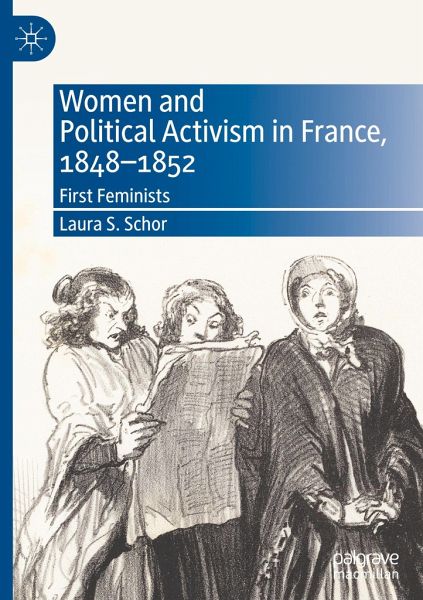
Women and Political Activism in France, 1848-1852
First Feminists
Versandkostenfrei!
Versandfertig in 6-10 Tagen
106,99 €
inkl. MwSt.
Weitere Ausgaben:

PAYBACK Punkte
53 °P sammeln!
This book is organized around the personal struggles of ten extraordinary French women activists: Eugenie Niboyet, Eugenie Foa, Suzanne Voilquin, Josephine Bachellery, Pauline Roland, Jeanne Deroin, Elisa Lemonnier, Desiree Gay, Adele Esquiros, and Marie Noemie Constant. Ranging in age from 52 to 20 in 1848, coming from different economic backgrounds, these women share a common quest to be included in the economic and political rights won by the revolt against the July Monarchy.Banding together in the face of exclusion from the right to work guaranteed to all men in February 1848, they write p...
This book is organized around the personal struggles of ten extraordinary French women activists: Eugenie Niboyet, Eugenie Foa, Suzanne Voilquin, Josephine Bachellery, Pauline Roland, Jeanne Deroin, Elisa Lemonnier, Desiree Gay, Adele Esquiros, and Marie Noemie Constant. Ranging in age from 52 to 20 in 1848, coming from different economic backgrounds, these women share a common quest to be included in the economic and political rights won by the revolt against the July Monarchy.
Banding together in the face of exclusion from the right to work guaranteed to all men in February 1848, they write petitions to the Provisional Government, and create the first daily feminist newspaper, "La Voix des femmes." The newspaper is a forum for their demands: midwives who demand to be paid as civil servants, domestic workers who demand support while unemployed, teachers who demand opportunities for higher education and for higher wages. The right to vote and the right to divorce are debated inthe newspaper.
Seeking to widen their support, Niboyet and her cohort launch a political club, Le Club de femmes, which is ridiculed in the satiric press. The women activists of 1848 do not withdraw from the public sphere. They form workers' associations. Deroin and Roland are imprisoned for their activism. All continue to work for women's rights as teachers, writers, and artists.
The women of 1848 inspire successive generations of women to continue their struggle.
Banding together in the face of exclusion from the right to work guaranteed to all men in February 1848, they write petitions to the Provisional Government, and create the first daily feminist newspaper, "La Voix des femmes." The newspaper is a forum for their demands: midwives who demand to be paid as civil servants, domestic workers who demand support while unemployed, teachers who demand opportunities for higher education and for higher wages. The right to vote and the right to divorce are debated inthe newspaper.
Seeking to widen their support, Niboyet and her cohort launch a political club, Le Club de femmes, which is ridiculed in the satiric press. The women activists of 1848 do not withdraw from the public sphere. They form workers' associations. Deroin and Roland are imprisoned for their activism. All continue to work for women's rights as teachers, writers, and artists.
The women of 1848 inspire successive generations of women to continue their struggle.














